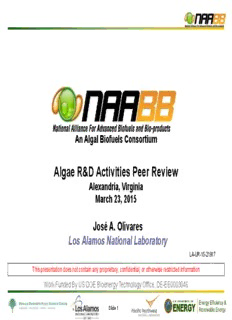
Algae R&D Activities PDF
Preview Algae R&D Activities
An Algal Biofuels Consortium Algae R&D Activities Peer Review Alexandria, Virginia March 23, 2015 José A. Olivares Los Alamos National Laboratory LA-UR-15-21917 This presentation does not contain any proprietary, confidential, or otherwise restricted information Work Funded By US DOE Bioenergy Technology Office, DE-EE0003046 Slide 1 Purpose of NAABB NAABB has developed and demonstrated science and technology that will significantly increase production of algal biomass and lipids, efficiently harvest and extract algae and algal products, and establish valuable conversion routes to fuels and co-products. Slide 2 NAABB Projected Objectives Outcomes Objectives Outcomes Developing technologies for cost-effective production of algal biomass and lipids 1.0: Algal Biology - Increase overall productivity of algal Super-performing, safely-deployable, algal biofuel production biomass accumulation and lipid/hydrocarbon content strains with greater overall productivity and enhanced lipid production 2.0: Cultivation - Increase overall productivity by Scalable cultivation practices for various environments. Optimized optimizing sustainable cultivation and production systems growth rates and lipid/hydrocarbon concentrations 3.0: Harvesting/Extraction - Develop cost-effective Innovative, low-energy, algal harvesting and lipid/hydrocarbon and energy efficient harvesting and lipid extraction extraction technologies integrated with cultivation and conversion technologies processes Developing economically viable fuels and co-products 4.0: Fuel Conversion - Develop technologies to convert Optimized conversion technologies for algal extracts and whole lipids/hydrocarbons and biomass residues into useful fuels algae into drop-in transportation fuels 5.0: Valuable Coproducts – Develop a set of valuable New animal and mariculture feed products from algae biomass coproducts to add profitability and provide flexibility to validated by FDA and cost-effective technologies for the allow responsiveness to changing demands/opportunities production of large-scale, marketable co-products in the market. Providing a framework for a sustainable algal biofuels industry 6.0: Sustainability Analysis – Quantitatively assess the Sustainable processes and resource management. Life-cycle and energy, environment, economic viability and sustainability economic analyses embedded in advanced system-level models. of the NAABB approaches to guide our strategy (cid:9) Slide 3 Quad Chart Overview Barriers Addressed Timeline • Ft-A. Feedstock Availability and Cost • Project start date: April 5, 2010 • Ft-B. Sustainable Production • Project end date: September 30, 2013 • Ft-C. Feedstock Genetics and - R&D Ended April 4, 2013 Development • Percent complete: 100% • Ft-D. Sustainable Harvesting • Ft-G. Feedstock Quality and Monitoring Budget (ARRA Funding) • Ft-N. Algal Feedstock Processing • Total project funding • Bt-A. Biomass Fractionation - DOE share: $48.6 M • Bt-B. Biomass Variability - Contractor share: $15.2 M • Bt-K. Biological Process Integration • Costs for FY10-12: $21.3 M • Tt-A. Feeding Dry Biomass • Costs for FY13: $9.3 M • Tt-B. Feeding or Drying Wet Biomass • Costs for FY14: $1.5 M • Funding for FY15: $0.143 M • Gt-C. Gasification of Biomass • Tt-E. Pyrolysis of Biomass and Bio-Oil Biology Stabilization 6% Cultivation $20.6M $15.2 M • Tt-G. Fuel Synthesis and Upgrading 10% 25% Academia SHARE • St-A. Scientific Consensus on Bioenergy Harvesting/Extracti 8% on Sustainability Fuel Conversion • St-C. Sustainability Data across the Valuable Coproducts Supply Chain 20% 17% $10.3 M $17.7 M • St-D. Indicators and Methodology for Sustainability/Econo INDUS Nat Labs mic Analyses Evaluating Sustainability 14% Management • St-F. Systems Approach to Bioenergy Sustainability Partners (Next Slide): 39 member institutions, Integrated PM team Slide 4 NAABB Algal Biofuels Consortium Partners Lead Institution: The Donald Danforth Plant Center*† * NAABB Team Management National Laboratories † NAABB Board of Directors • Los Alamos National Laboratory / New Mexico Consotrtium*† • Pacific Northwest National Laboratory*† • Idaho National Laboratory • National Renewable Energy Laboratory • USDA - ARS Industry Universities • Albermarle Catilin† • Brooklyn College • Diversified Energy • Clarkson University • Eldorado Biofuels • Colorado State University*† • Genifuel • Iowa State University • Cellana† • Michigan State University† • Inventure • New Mexico State University*† • Kai BioEnergy • North Carolina State University • Palmer Labs • Texas AgriLife Research / Texas A&M University • Phycal System*† • Reliance Industries Limited • University of Arizona*† • Pan Pacific, Ltd. • University of California Los Angeles • Solix Biofuels*† • University of California Riverside • Targeted Growth† • University of California San Diego • Terrabon • University of Pennsylvania • UOP a Honeywell Company† • University of Texas (sub) • Valicor • University of Washington • Washington State University • Washington University St. Louis Slide 5 NAABB Partners Slide 6 Overview – NAABB Integration of Technologies Slide 7 New Strain Isolation and Development Slide 8 • Cultivation • The ARID raceway system has been shown to be cost effective – CAPEX > 8% OPEX < 45% Advanced AgroBioFuels, LLC • A commercial photobioreactor system that mimics a pond environment has been developed and a start-up company, Phenometrics, initiated Slide 9 • Harvesting • Current bottlenecks to cost effective production of biofuels from algae – traditional is centrifuge • Need to concentrate from 1 g/L to 40 or 100 g/L prior to extraction Acoustic Focusing Electrocoagulation Filtration Slide 10
Description: